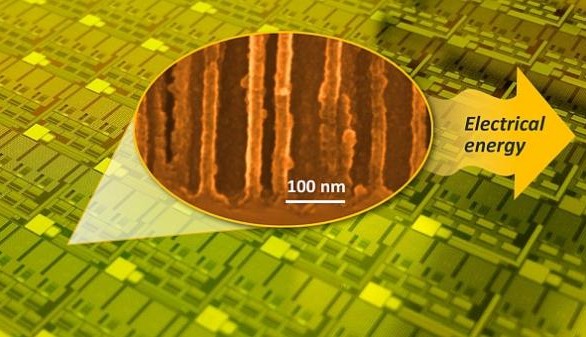Micro-supercapacitor fits inside IoT chips
June 13, 2016
on
on

Zero-power autonomous devices will abound on the IoT of the future, and battery manufacturers are scratching their heads to come up with the best possible solution ensuring high energy and power density at miniature scale. A new material developed recently at Finland-based VTT shows promise, based on energy and power density of a supercapacitor depending on the surface area and conductivity of the solid electrodes. The size? So small it fits inside an IC.
VTT's research group has developed a hybrid nanomaterial electrode, which consists of porous silicon coated with a few nanometer thick titanium nitride layer by atomic layer deposition (ALD). This approach leads to a record large conductive surface in a small volume. Inclusion of ionic liquid in a micro channel formed in between two hybrid electrodes results in extremely small and efficient energy storage.
VTT’s in-chip supercapacitor enables storing energy of as much as 0.2 joule and a whopping 2 watts on a 1-mm2 silicon chip. At the same time it leaves the surface of the chip available for microcircuits, sensors and stuff.
We’re passing the word that VTT are currently seeking a party interested in commercializing the technique.
VTT's research group has developed a hybrid nanomaterial electrode, which consists of porous silicon coated with a few nanometer thick titanium nitride layer by atomic layer deposition (ALD). This approach leads to a record large conductive surface in a small volume. Inclusion of ionic liquid in a micro channel formed in between two hybrid electrodes results in extremely small and efficient energy storage.
VTT’s in-chip supercapacitor enables storing energy of as much as 0.2 joule and a whopping 2 watts on a 1-mm2 silicon chip. At the same time it leaves the surface of the chip available for microcircuits, sensors and stuff.
We’re passing the word that VTT are currently seeking a party interested in commercializing the technique.
Read full article
Hide full article


Discussion (0 comments)